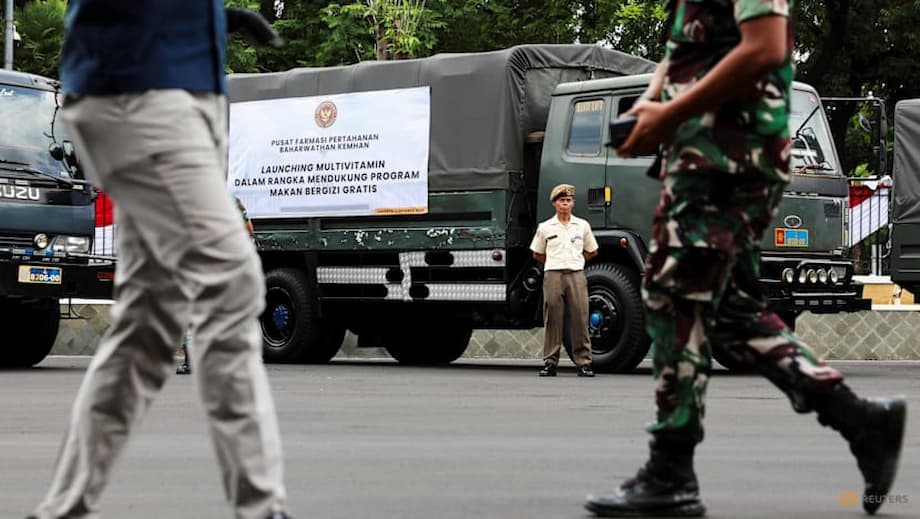A new push blending defense and public health
Indonesia has opened a new chapter in its social programs by tapping its armed forces to produce multivitamins for children receiving free meals. The move signals a wider government strategy that blends public health goals with defense sector capacity. In the capital, Deputy Defence Minister Donny Ermawan Taufanto presided over the handover of 4.8 million vitamin pills to 100 kitchens that prepare daily portions for students, a symbolic start to a planned nationwide rollout. Officials say distribution will expand beyond Jakarta as production ramps up.
The vitamin initiative follows an earlier step by the military laboratory to manufacture basic medicines for the public. That effort is linked to a large distribution network of government cooperatives across the country. At the same ceremony, officials also sent 17.4 million pills, including painkillers and antibiotics, to those cooperatives, framing the new line of work as a way to lower costs and strengthen supply.
The free meals program, a signature promise of President Prabowo Subianto, has faced intense scrutiny after a series of food poisoning incidents since its January launch. Authorities acknowledge thousands of children have been sickened. Health groups urged a pause to improve safety. The government apologized, kept kitchens running, and argued that the nutrition needs of children are too urgent to put on hold. The military’s entry into vitamin and medicine production is presented as part of a broader push to make essential health products more affordable.
What is the free meals program?
Launched at the start of the year, Indonesia’s free meals program aims to reach tens of millions of children and pregnant women. The budget set aside for 2025 is about 171 trillion rupiah, a sum that puts the program among the largest social initiatives in the region. Planners have targeted coverage of up to 83 million recipients by year end, with more than 20 million people already receiving meals at various points in the rollout.
The ambition is to cut child stunting and wasting, problems that have long undermined health and learning outcomes. Government and UNICEF data show roughly one in five Indonesian children under five are stunted and about one in twelve are wasted. Micronutrient deficiencies are common, which is why vitamin supplementation is attractive as an add-on to balanced meals. Programs of this scale depend on careful food handling, reliable cold chains for perishable items, and consistent training of staff in thousands of kitchens.
Why is the military making medicine?
Officials frame the initiative as part of national defense of the pharmaceutical sector. By producing common medicines and vitamin tablets in a military lab, they aim to cut import dependence, stabilize supply, and deliver lower prices to the public. The armed forces can draw on logistics capabilities built over decades, which leaders say can help move safe, low cost products quickly to schools and local communities.
Distribution is routed through a vast network of state supported cooperatives that serve towns and villages. In theory, that lowers costs through economies of scale and widens access beyond big cities. In practice, success hinges on robust quality assurance. Every batch of tablets and medicines needs full regulatory approval, independent testing, and traceability. Public trust will depend on transparent reporting of safety checks and pricing, not only on production volume.
Introducing the plan, Deputy Defence Minister Donny Ermawan Taufanto said the vitamin line was built to support the school meals drive and that output could reach many millions of pills. He also stressed affordability as production grows.
Donny Ermawan Taufanto, Deputy Defence Minister, said: “As the military lab increases its production capacity, we can reduce the cost of production so we can offer medicine with a more affordable price.”
Safety lapses and how officials are responding
The program’s scale has brought serious safety challenges. Since January, food poisoning linked to free meals has affected more than 9,000 children nationwide. Earlier counts presented to lawmakers were lower, then rose as new outbreaks were reported. One recent incident sickened hundreds of children in a single province and triggered a broader review of oversight.
Leaders of the National Nutrition Agency, which manages implementation, have acknowledged failures. Deputy head Nanik Deyang apologized publicly and cited inconsistent compliance with standard operating procedures. Officials have moved to strengthen supervision, ban highly processed items from menus, and shut kitchens that lack proper health certificates. Local authorities say dozens of non compliant kitchens have been closed while inspections continue. Investigations with food regulators and police are under way, and training requirements for kitchen staff are being tightened.
Nanik Deyang, deputy head of the National Nutrition Agency, said: “We take full responsibility,” attributing the outbreaks to partners and internal teams not following standard operating procedures and vowing increased supervision.
Agency leaders have also put the outbreaks in statistical perspective, citing millions of portions served and a relatively small share of suspected cases. They say the program will continue, while targeted suspensions apply in areas with confirmed contamination. The priority, they argue, is to fix the weak points without halting nutrition support to children who rely on the meals.
Critics warn about expanding military influence
Student groups and civil society activists have raised concerns that the growing military footprint in civilian programs could chip away at democratic norms. Their fear is rooted in history. Under Suharto, Indonesia’s military doctrine embedded a dual function in governance and security. Reforms after 1998 curbed that role. The military’s current work on food security, logistics, and now pharmaceuticals has revived debate over where to draw the line.
Advocacy groups focused on education and public health have urged a temporary pause in kitchens with repeated safety lapses and called for stronger external oversight. They argue that credibility depends on independent audits, public dashboards that track incidents, and clear triggers for corrective action. Some want the military’s role in medicine production reviewed by both health regulators and parliament to keep civilian accountability intact.
Ubaid Matraji, head of a national education watchdog, told lawmakers: “The government must stop the programme to put in place stronger oversight,” describing a pattern of failures in food preparation and safety.
Members of parliament overseeing health issues have promised to relay civil society proposals to the National Nutrition Agency. At the same time, legislative leaders say the program will continue because they see it as strategic for child nutrition.
Charles Honoris, deputy head of the parliamentary committee on health, said: “The programme is strategic and will be executed,” noting that stronger supervision will be urged.
Can vitamins solve a nutrition problem?
Multivitamins can help when children lack essential micronutrients, but tablets are not a substitute for safe and balanced meals. The first guardrail is food safety. Kitchens need standardized recipes, hygienic facilities, reliable water, and temperature control for ingredients like meat, eggs, and dairy. Vitamins add value only when the meal itself is safe to eat.
Nutritionists also point out that the best results come from foods rich in protein, iron, zinc, folate, iodine, and vitamin A, tailored to local tastes and supply. Highly processed items are often cheap and easy to distribute, but heavy reliance on them can undercut health goals. Clear menu standards, local sourcing, and regular inspections reduce risk and improve nutrition quality.
There are safety considerations for supplements too. Fat soluble vitamins, such as A and D, can be harmful in excessive doses, although standard school tablets are typically designed well below toxic levels. Safe use still depends on proper labeling, training for staff who handle distribution, and channels for parents to ask questions. A transparent recall protocol for any defective batch of tablets is essential.
What to watch in the months ahead
The defense ministry says vitamin shipments will expand beyond Jakarta as the lab increases capacity. Officials also plan to produce medicines for chronic conditions such as diabetes, heart disease, and high blood pressure. The lab-to-cooperative model could bring lower priced generics to remote areas if quality controls hold and supply chains run smoothly.
On the meals front, the National Nutrition Agency has outlined steps to prevent further outbreaks: tighter oversight, more inspectors, and stronger requirements for health certificates. Kitchens that fail audits are being shut until they meet standards. Policymakers expect a larger budget next year, but an internal estimate suggested only about 99 trillion rupiah is likely to be spent this year, given implementation limits. That increases the pressure to focus on quality, not only on scale.
Independent monitoring will shape public trust. Key tests include whether incident reporting becomes real time, whether communities can see which kitchens are certified, and whether training reaches staff in every province. If vitamins and medicines arrive reliably, and if kitchens operate safely with balanced menus, the program could improve child nutrition at a national scale while keeping risk in check.
What to Know
- Indonesia’s military has started producing multivitamins for children in the free meals program and handed over 4.8 million tablets to 100 kitchens in Jakarta.
- The military lab has also supplied 17.4 million pills, including painkillers and antibiotics, to government cooperatives and plans to produce medicines for chronic diseases.
- Food poisoning linked to free meals has sickened more than 9,000 children since January, prompting apologies, investigations, and kitchen closures.
- The National Nutrition Agency says it is increasing supervision, banning highly processed items from menus, and shutting non certified kitchens until standards are met.
- Health groups have urged temporary suspensions where outbreaks occur, while lawmakers call the program strategic and say it will continue with stronger oversight.
- The free meals initiative targets tens of millions of recipients, with a 2025 budget of about 171 trillion rupiah; officials expect a larger budget next year.
- Officials present the military role in medicine as a way to lower costs and stabilize supply, but success depends on strict quality control and transparency.












